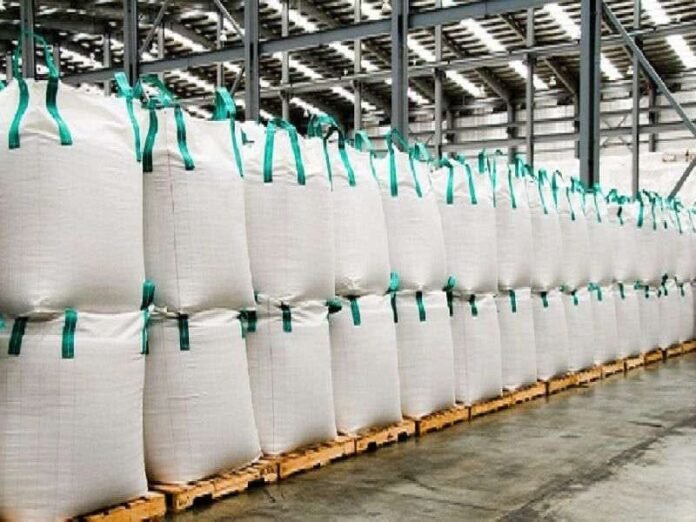Last Updated on July 14, 2024 by Asfa Rasheed
In the realm of industrial packaging, large bulk bags play a pivotal role in transporting and storing a wide range of materials. These versatile containers, also known as FIBCs (Flexible Intermediate Bulk Containers), have become indispensable in various industries due to their efficiency and cost-effectiveness. In this comprehensive guide, we will delve into the secrets of large bulk bags, uncovering everything you need to know about their design, applications, benefits, and the key players in their manufacturing.
Table of Contents
Understand Flexible Packaging Solutions services
FPS, Flexible Packaging Solutions is a leading provider of innovative and sustainable flexible packaging solutions, specializing in the production of Flexible Intermediate Bulk Containers (FIBCs), container liners, and more. With a focus on diverse industries such as chemical, food, pharmaceutical, and agriculture, FPS ensures the safe transit of critical products worldwide, contributing to supply chain efficiency. Notably, FPS has established the world’s largest FIBC recycling hub in Romania, demonstrating a commitment to sustainability by reprocessing used FIBCs into high-quality Post-Consumer Recycled (PCR) resin.
Big bags, also known as FIBCs, have transformed the handling, transportation, and storage of bulk materials across industries. In this blog post, we explore the ideal applications of big bags and delve into their classifications.
Ideal uses of big bags
1. Bulk material transport
Big bags are efficient for transporting various bulk materials, including grains, chemicals, minerals, and agricultural products. Their large capacity minimizes the need for multiple smaller packages.
2. Construction industry
Durable and flexible, big bags are commonly used in the construction sector to transport and store materials like sand, gravel, and cement, meeting the dynamic needs of construction sites.
3. Chemical industry
Designed for secure and sealed transportation, big bags are ideal for transporting chemical powders and granules, preventing contamination and ensuring material integrity.
4. Agricultural applications
Big bags find extensive use in agriculture for handling and transporting fertilizers, seeds, and other bulk agricultural products, providing ease of use and protection against external elements.
5. Waste management
In waste management, big bags are employed for the collection and disposal of bulk waste materials due to their large capacity and durability, contributing to efficient waste disposal practices.
Understanding large bulk bags
Large bulk bags are woven polypropylene containers designed to handle and transport a diverse array of materials, from powders and granules to chemicals and food products. They are known for their flexibility, strength, and ability to contain large volumes of goods efficiently. These bags are equipped with lifting loops, allowing for easy handling using forklifts or cranes, making them an ideal solution for bulk material transportation.
Key features of large bulk bags
Size variability
Large bulk bags come in various sizes, ranging from a few hundred to several thousand pounds of capacity. This flexibility in size makes them suitable for different applications across various industries.
Durability
Constructed with high-quality woven polypropylene, large bulk bags are known for their durability and strength. This ensures the safe transportation of materials, even in challenging conditions.
Customization
Bulk bag manufacturers offer customization options, allowing businesses to tailor the bags to their specific needs. This includes variations in size, lifting mechanisms, and additional features like liners or sift-proof seams.
Applications of large bulk bags
Large bulk bags find applications in diverse industries due to their adaptability. Some notable applications include:
- Agriculture: Transporting and storing fertilizers, seeds, and grains.
- Chemical Industry: Handling and transporting various chemicals and powders.
- Food Industry: Safely storing and transporting bulk food ingredients.
- Construction: Transporting sand, gravel, and other construction materials.
- Pharmaceuticals: Managing and transporting pharmaceutical powders and materials.
Benefits of large bulk bags
Cost-effective transportation
Large bulk bags offer a cost-effective solution for transporting bulk materials compared to traditional packaging methods. Their ability to hold large volumes reduces the need for multiple smaller containers.
Storage efficiency
These bags optimize storage space, as they can be stacked and stored in a compact manner. This is especially beneficial in warehouses where space is a critical factor.
Reduced environmental impact
The use of large bulk bags reduces the amount of packaging waste generated, contributing to sustainability efforts. Their reusability also makes them an eco-friendly option.
Improved handling
Equipped with lifting loops, large bulk bags facilitate easy handling and transportation. This not only enhances efficiency but also minimizes the risk of accidents during loading and unloading.
Bulk bag manufacturers
When it comes to large bulk bags, choosing a reliable manufacturer is crucial to ensure the quality and reliability of the bags. Here are some key players in the bulk bag manufacturing industry:
A reputable manufacturer offering a wide range of large bulk bags tailored to meet the specific needs of different industries. Their commitment to quality and customization. With a focus on innovation and customer satisfaction, this manufacturer stands out for its cutting-edge designs and high-quality materials used in large bulk bag production.
Conclusion
Large bulk bags have become an integral part of modern industrial packaging, revolutionizing the way materials are transported and stored. From their customizable features to the myriad of applications across industries, these bags offer a cost-effective and efficient solution for businesses. Choosing a reliable manufacturer is paramount to ensuring the durability and performance of large bulk bags, making it essential to partner with trusted industry leaders. As industries continue to evolve, large bulk bags will undoubtedly remain a key player in the logistics and transportation landscape.



























